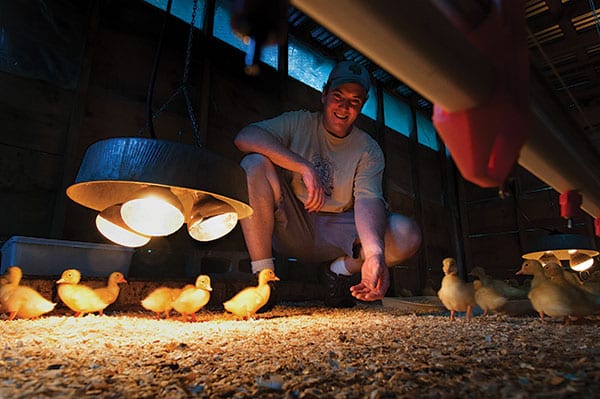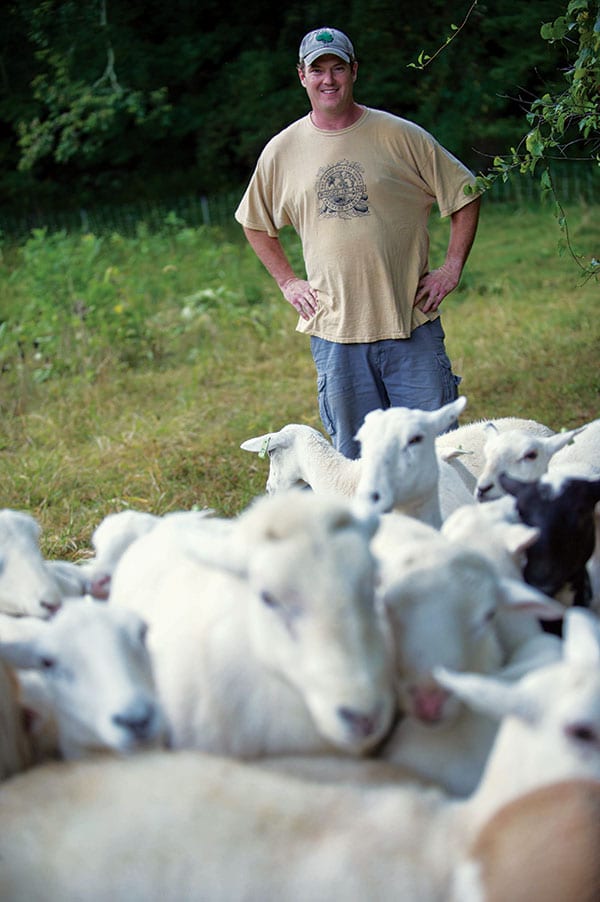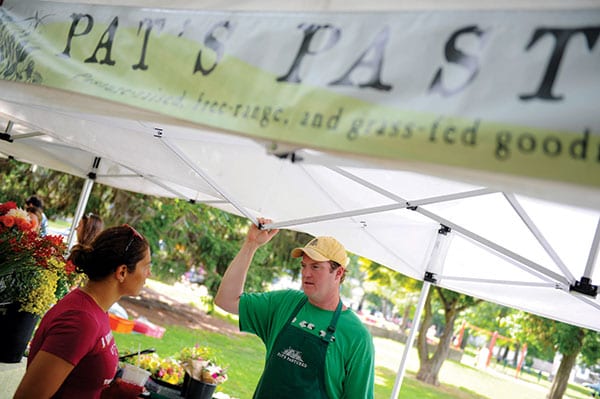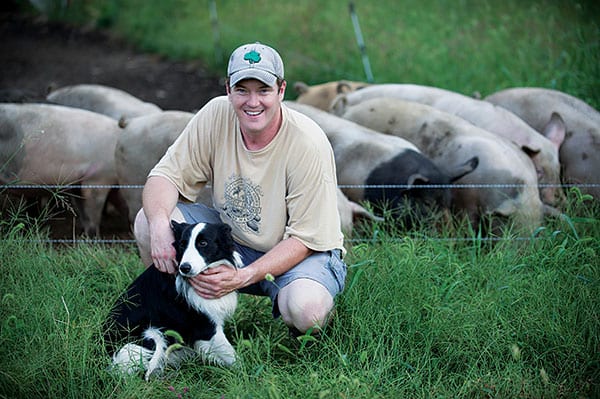October 25, 2014
Patrick McNiff ’96 raises animals — and awareness — at his farm in Rhode Island
At the Hope Street Farmer’s Market in Providence on a sunny autumn morning, eggs sputter on a food-cart grill. Wide slices of juicy bacon are wrapped around lettuce and tomato, then tucked into a toasted bun. Beef bratwurst, infused with Harpoon ale, shares a plate with pickled onions and mustard.
Nearby stands Patrick McNiff ’96. He isn’t cooking, but he can tell you all about the menu. Those eggs are from his chickens, that bacon and bratwurst are from his pigs. He owns Pat’s Pastured, an 87-acre farm in East Greenwich, R.I., where he raises free-range animals on natural diets — beef cattle, pigs, and lambs; Cornish rock and French Poulet Rouge chickens; laying hens; ducks and quail for their eggs; and 400 turkeys for Thanksgiving.
McNiff sells the meat and eggs to 13 restaurants and several natural food markets. Customers buy his products through an online store and through Community Supported Agriculture (CSA) shares in his farm. Pat’s Pastured also sells at three farmer’s markets during the winter and five in the summer, including Hope Street, a grower-run market of which McNiff is president.
“People are looking for a healthier product, with real taste, raised humanely in a way that preserves the land,” said McNiff. “We’re not just selling a product, we’re bringing education and services as well. We need to educate consumers, if only to teach that local food is important.”
There’s a synergy at McNiff’s farm. The cattle renew the grass that the chickens eat. The pigs root and dig in the woods. The chickens and turkeys are allowed to peck and scratch. The cows graze.
McNiff believes that agriculture should be “a natural recovery system to minimize waste.” So, a local brewery gives him its spent grains — the wet, heavy, oatmeal-like product that’s left when sugars are extracted — to feed his pigs and chickens. The pigs also love whey, a byproduct of cheese making. A cider mill provides bruised apples for the pigs in trade for the gift of a hog.
The animals’ natural and diverse diet means leaner, more flavorful meat, lower in saturated fat and healthier for the consumer — “a very different food,” McNiff said.
The animals are herded by Trav, a border collie, and protected by four livestock guardian dogs that McNiff also breeds for other farmers. Weighing 120 pounds, they are hybrids of Anatolian Shepherds, Akbash, and Great Pyrenees. They are outdoors year-round, using their shelter only during ice storms. They eat raw meat and bones.

“People today are very disconnected from the natural world of the animal,” said McNiff. “Dogs and cats are carnivores and omnivores. Pigs are omnivores. Cattle and sheep are ruminants. They eat grass.”
As much as he is a farmer, McNiff is a teacher. He hires apprentices to work with him. He welcomes children on field trips. Volunteers come from high schools and colleges, including PC. McNiff opens the farm for tours and classes. He’ll offer a workshop on how to build a wood-fired earth oven to bake pizzas and bread, so that customers can learn a skill and be fed as well. He has classes on sausage making, on knife skills, on butchering.
“The only reason we sell chicken parts at all is that people can’t cut up a chicken,” said McNiff. “One of the biggest blocks people have is fear of food. We are a generation that has lost its skill in cooking because of processed and pre-packaged food.
“It’s great for people to learn how to make a sausage,” McNiff said. “There’s a real hunger, literally and figuratively, for homesteading skills.”
McNiff resides in a farmhouse on the property (“I have a couple of prosciuttos hanging in my closet here.”). His most important tool is his iPhone, which keeps him in touch with workers during the day and rests beside him at night so he doesn’t miss restaurant orders.
“On a certain level, it’s a lifestyle to me and not just a job,” McNiff said.
Growing up in Westbury, N.Y., on Long Island, McNiff absorbed the importance of serving others from his parents, teachers who had been in religious life before they married. His mother further credits the Franciscans at St. Anthony’s High School in South Huntington with instilling in him the ethics of environmentalism.
But it was an otherwise ordinary suburban childhood. “We grew marigolds and impatiens, and maybe one tomato plant, and our livestock was a Cockapoo,” McNiff said.
McNiff came to PC to play lacrosse, but that was interrupted during his junior year when he studied abroad at University College Dublin. By then he also had discovered another interest, PC’s new Feinstein Institute for Public Service. It offered the country’s first minor in public and community service studies, which would have been McNiff’s major if it had been available at the time.
Working with the Feinstein Institute “was one of the life-changing events in my personal history,” said McNiff.
Through Feinstein, McNiff built houses with Habit for Humanity and worked with at-risk youth in the nearby Smith Hill neighborhood. He ran PC’s Urban Action program, which engages freshmen in community service. And he was introduced to urban agriculture through Generation One, a 10,000-square-foot community garden in Smith Hill.

“I was always looking for a way to build community,” said McNiff. “Agriculture seemed a good way. We all exist on land in some way, and we all eat. It was a way to bring people together, even if it was just to share a recipe.”
After graduating from PC with a history degree, McNiff remained in Rhode Island to work at Generation One. Then the Smith Hill Community Center hired him to run a set of community gardens. For eight years, he was program director for the Southside Community Land Trust, running an urban organic farm in South Providence.
By then, McNiff was hooked on farming. He enrolled in a master’s-degree program in community economic development through Southern New Hampshire University. It was a hands-on program that only required him to spend a few days a month in the classroom.
While other students worked on housing, homelessness, and urban development projects, McNiff was “the urban agriculture guy.” Required to create a practical project for his thesis, McNiff turned 50 acres of state-owned land in western Cranston into Urban Edge Farm, which exists today. It gives the disadvantaged, including immigrants and minorities, the opportunity to farm.
The master’s degree in 2003 gave McNiff a background in financial management and accounting, the skills to go into business on his own. While managing Casey Farm in North Kingstown from 2006 to2010, he began raising a few chickens with the vegetables. A book — Pastured Poultry Profits by Joel Salatin — sold him on the idea of raising livestock naturally.
In 2009, he leased 50 acres in Jamestown and opened Pat’s Pastured. When that property was listed for sale in 2011, he won a lease from the East Greenwich Land Trust and moved his farm there.
The biggest challenge in Rhode Island is the lack of available and affordable land for farming, McNiff said. The state’s best farmland is used to grow its major agricultural goods: turf and nursery products. Rhode Island produces only 1 percent of the food it consumes, which puts it “at the bottom of the bottom” nationally, McNiff said.
Raising livestock is especially land-intensive. McNiff’s animals are moved about the property constantly.
“Rhode Island has a small land base, and the best farmland has been turned into housing,” said McNiff. “We live in a state where the local food system is built on sand because we don’t have affordable land. It’s a tough barrier.”
To turn large animals into food requires a slaughterhouse. When a plant in Athol, Mass., burned, McNiff turned to businesses in Vermont and upstate New York to slaughter his 20 hogs and three beef cattle per month. Then, with a half-dozen farmers, he founded the Rhode Island Raised Livestock Association. They use a slaughterhouse in Johnston and a processing facility in Westerly, keeping the money instate.
McNiff processes poultry himself, thanks to a USDA exemption and a mobile, stainless-steel processing unit that he built. He processes 11,000 broiler chickens a year — about what Perdue does in two hours, he said.
At the farm, he employs four people full time and 16 part time. He has a bookkeeper and an accountant.

“Farming is not going to produce 100,000 jobs,” said McNiff. “But small farms like mine can produce really good jobs for people who want to work in this industry. And there’s a multiplier effect.”
McNiff is proud that three PC students who worked with him have pursued careers in a variety of agricultural occupations — farming, plant breeding, and land conservation.
Kristian Karl ’12 and his wife, Francesca L. (Granato) Karl ’11, raise grass-fed beef and lamb, goats, poultry, and pork on a farm in Medina, N.Y., and grow organic vegetables. They also have a farm-to-table restaurant in New Paltz. Karl interned with McNiff, who sold Karl his first sheep.
“Pat is the nicest guy in the world,” said Karl. “He gave me the opportunity to learn the essentials of sustainable livestock farming on his dime. It was great.”
Adrienne Shelton ’99 and Michelle Sheehan ’01 worked with McNiff when he was program director at the Southside Community Land Trust. Shelton installed two community gardens in Smith Hill, but “having no agricultural background, I worked closely with Pat to get advice on how to plant,” she said.
Shelton now is focusing on plant breeding for organic farming in a doctoral program at the University of Wisconsin in Madison. As part of her research, she will release a new variety of open-pollinated sweet corn adapted for organics.
Sheehan works in the Land Conservation Program of the Rhode Island Department of Environmental Management, purchasing and conserving land, and protecting farmland by purchasing development rights.
All were connected through the Feinstein Institute.
“The professors at Feinstein taught you to think about ‘how you know what you know,’” said McNiff. “They wanted you to think about where your information was coming from. They constantly challenged you. It made an impression.”






